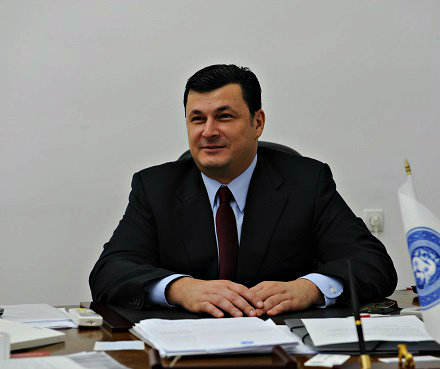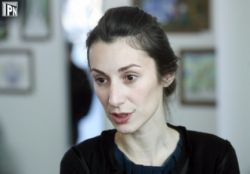
Aleksandre Kvitashvili, Ukraine’s new health minister, had the same position in Georgia during Saakashvili. (Photo by Tbilisi State University.)
TBILISI, DFWatch–Tbilisi takes it as a slap in the face that Ukraine has appointed a former member of government from Georgia as health minister.
On Tuesday, the Ukrainian parliament, Verkhovna Rada, agreed to appoint Alxandre Kvitashvili, a former Georgian health minister, to the same position in Ukraine.
He has background from the National Movement, the party which ran Georgia for almost a decade under its leader Mikheil Saakashvili, ushering in neoliberal reforms as it angered increasing sections of the population by its hard-handed rule.
The party lost power in 2012, and the new coalition currently in government in Georgia did not like Kvitashvili’s appointment. Tbilisi’s fury was so strong that rumors circulated that the Georgian ambassador to Ukraine had been recalled.
But Ambassador Mikheil Ukleba dispelled the rumors as untrue.
The government coalition, called Georgian Dream, has for the last two years tried to mend relations with Russia, while maintaining a pro-EU and pro-NATO foreign policy, signing an association agreement with the EU last June. The National Movement claims Georgian Dream is a tool for Russian interests and wants the coalition to break off its negotiations – the Abashidze-Karasin talks – that have managed to bring back Georgian agricultural products and wine to the vast Russian consumer market, boosting export.
During the National Movement, the health system went through neoliberal reforms that aimed at making it attractive for foreign investors to put their money into newly privatized hospitals. The strategy succeeded in bringing in nearly 500 million US dollars, and in big cities and districts up to 80% of clinics were privately run. The free-wheeling reform resulted in the health system becoming increasingly unpopular among the average Georgian. Many clinics were in bad shape and ambulances would break down during emergencies due to lack of maintenance – indicators of mismanagement on a government level.
Speaker of Parliament Davit Usupashvili, who is from the government coalition, said he wished Kvitashvili good luck with realizing his ideas in Ukraine, ideas which he failed to realize in Georgia during his tenure, adding that his ministry did not have much good impact on the Georgian health system.
Some other members of government and MPs from the ruling Georgian Dream coalition expressed their regrets with the decision of the new Ukrainian government.
Tedo Japaridze, the head of the parliament’s foreign relations committee, attributed the current and potential future appointments to a major failure of Georgian diplomacy.
Kvitashvili (44) served as a minister of labor, health and social affairs in Georgia in 2008-2010 and as rector of Tbilisi State University, the biggest university in the country, in 2010-2013. He is a professional health manager and has worked in various international and non-governmental organizations.
Kvitashvili, a subtle manager who mostly kept out of the media limelight, was proposed by the Petro Poroshenko Bloc. The latter quickly granted him Ukrainian citizenship.
Three foreigners have been appointed in the new Ukrainian Cabinet. Apart of Kvitashvili, they are Natalia Jaresko, a U.S. national, as finance minister and Lithuanian banker Aivaras Abromavicius.

Eka Zghuladze, also with background from Saakashvili’s regime, is tipped as Ukraine’s new deputy interior minister. (Interpressnews.)
The foreigners are to facilitate reforms in the crisis-hit country where corruption is widespread and a war is raging in the southeast regions.
Ukrainian and pro-National Movement Georgian media claim that Poroshenko might also propose to appoint Eka Zghuladze as a deputy minister of interior. She was deputy interior minister in Georgia briefly before the National Movement’s defeat in the 2012 elections.
There are also speculations that Zurab Adeishvili might be appointed as head of Ukraine’s anti-corruption body. He was a close ally of Saakashvili and the architect of much of judicial reform and is currently abroad, wanted on criminal charges in his home country.





Leave A Comment
You must be logged in to post a comment.